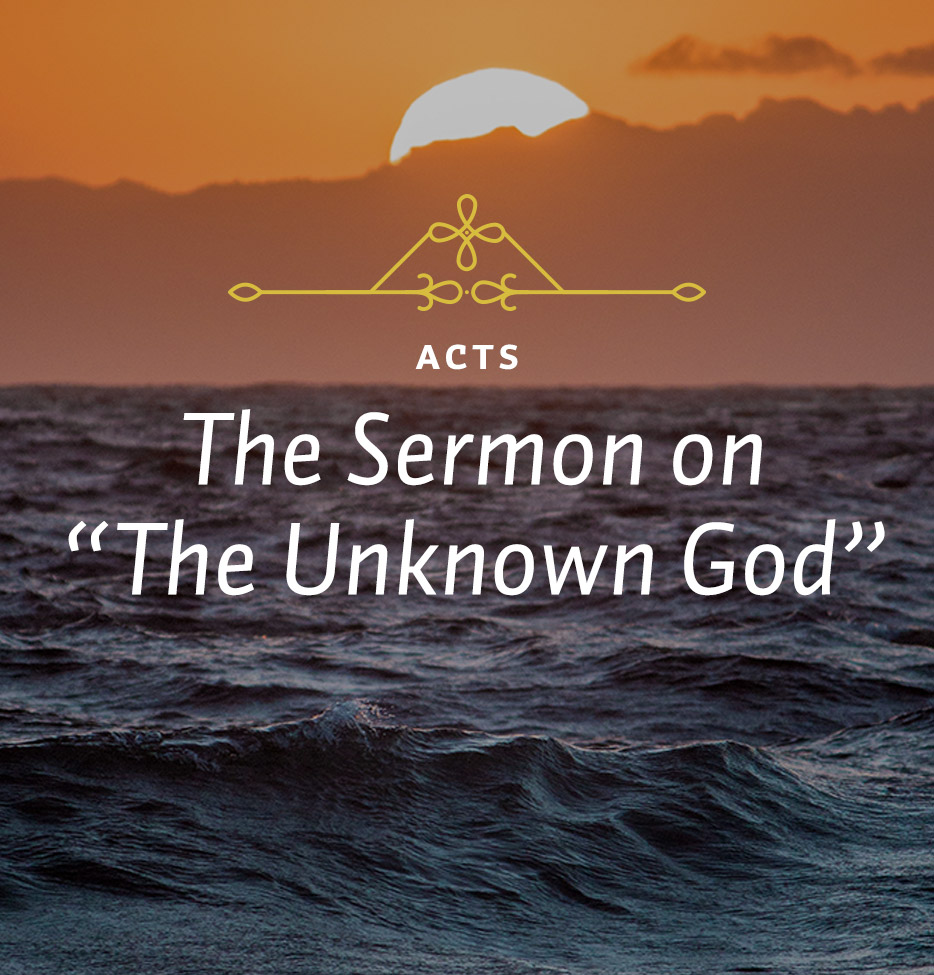Paul’s address begins in verse 22. It is a classic. When you write a formal address or sermon, you generally begin with an introduction, have three or four main points and then a good conclusion. This is exactly what Paul does here. He has a short but brilliant introduction, followed by four clear points. His first point is that God is the Creator of all things. His second point is that God is the sustainer of all things. His third point is that God is the ordainer of all things. His fourth point is that we should seek Him. Then there is a conclusion, which says that we should repent since we have not sought God as we should. To this he appends three sharp inducements.
The Introduction. Paul began by reminding the Greeks of something he had noticed as he walked through the city. He said, “Men of Athens! I see that in every way you are very religious. For as I walked around and observed your objects of worship, I even found an altar with this inscription: TO AN UNKNOWN GOD. Now what you worship as something unknown I am going to proclaim to you” (vv. 22-23).1 Nobody has found this altar, but there are references to similar inscriptions in ancient writings. A number of ancient visitors to Athens saw altars or statues that bore such writing.
Paul does not say at this point why the true God was unknown to the Athenians, though we know what he thought about this from his teaching in Romans 1. The reason why men and women do not know God is that they do not want to know Him. God has made Himself known. The reason we do not know God is that we reject the revelation. We do not like the God who is there. Paul does not say that here. Instead, he cites the Greeks’ ignorance, proposing to correct it by his proclamation.
Sometimes people ask how to deal with people who seem blind to Christian truth. Peter wrote, “Always be prepared to give an answer to everyone who asks you to give the reason for the hope that you have” (1 Peter 3:15). We want to be able to do that. But generally, I say the problem is not in the nature of our reasoning or explanation but rather in the rebellion of the human heart. The problem is the hearer. Paul’s solution—indeed, the solution of Christian preaching generally—is proclamation. It is declaring who God is and what He has done and allowing God to bless the declaration. What happens is that God takes the truth of His Word and by the power of His Holy Spirit carries it to the heart and brings conviction.
1. God is the Creator of all things. Paul’s first point, after his introduction, is that God is the Creator of all things. Verse 24: “The God who made the world and everything in it is the Lord of heaven and earth and does not live in temples built by hands.” The doctrine of creation, in addition to teaching man’s responsibility to seek and serve Him (which Paul develops later), means that God has not left Himself without a witness. It is true that not all people have had the Scriptures. In the Old Testament period God gave the Bible only to the Jews. But all people at all times have nevertheless had a witness to God in creation, in the heavens and on earth. No one can claim utter ignorance of the true God.
2. God is the sustainer of all things. Paul’s second point is that God is the sustainer of all things. Verse 25: “He [God] is not served by human hands, as if he needed anything, because he himself gives all men life and breath and everything else.” God sustains His creation. It is not that we provide for Him; He provides for us.
There is an interesting debate at this point as to whether creation was made once for all, after which God let it go, as it were, or whether God sustains it constantly by what might be called “moment by moment creation” or “continuous creation.” Did God create the world and then just continue to preserve and guide it? Or does he constantly re-create it in the sense that, if God stopped creating it for even a single instant, everything we know would disappear? I do not have the answer to that, and I am not sure anyone else does either. But I know that in the first chapter of Colossians Paul says that “in him [that is, Christ] all things hold together” (v. 17). That seems to suggest that, if the Lord Jesus Christ were not holding all things together, everything would fly apart.
I think this is what Paul proclaimed in Athens: a God who not only created all things but who sustains them, perhaps not by a “moment by moment” creation, though that is not excluded, but at least by continuing to give the universe and world stability. The very fact that we and the world are here, that we are alive and that we can think about both it and ourselves, are all due to the sustaining activity of God.
1Because of the nature of the Greek language, the inscription, which lacks the definite article, can be rendered either “to an unknown god” (NIV) or “to the unknown god” (KJV and other texts).






